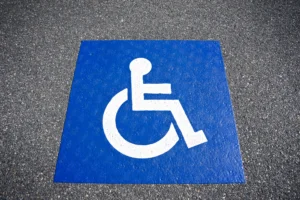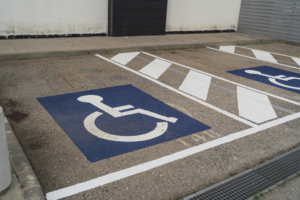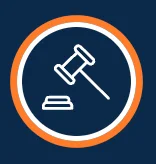Busy modern life requires that all of us get out and about, whether it’s going to work, school, running errands, or simply going to see family and friends. People with disabilities should enjoy the right to do these things just as much as any other American. Yet oftentimes, businesses, government entities, or even private individuals do not provide the proper accommodations required by the law, and this can put people with disabilities in danger of physical harm, especially from slips, trips, and falls.
William Jordan and the team at Jordan Law Center have decades of combined experience working on slip, trip, and fall cases where property owners of all different types did not make their properties accessible to disabled people the way that they should have, and one of the tools for effectively recovering on these cases is the ADA.
The Americans with Disabilities Act (often abbreviated to ADA) is one of the triumphs of modern American civil rights law, prohibiting discrimination on behalf of any person or entity (whether public or private) against people with disabilities. Research shows that approximately 61 million people in the United States currently live with some form of disability, so the ADA protects and guarantees the rights of close to 20% of the American population. South Carolina has adopted the ADA and it applies across the state.
One of the main ways that the ADA protects these rights is by providing access to business or government buildings that are open to the public. The ability to safely park, exit a vehicle, navigate from the parking lot to the building, and enter the building are rights guaranteed by the ADA.
All parking lots must have clearly striped and designated handicapped parking spaces, marked in blue and with the well-known International Symbol of Accessibility:

The parking spaces must be on flat and level ground, and they must have clearly painted “access aisles” so that disabled people have a safe place to walk. Access aisles are the diagonal lines that indicate places where no vehicle parking or traffic is allowed:

Disabled people are legally entitled to a safe path to the establishment entrance, which means a way to get from the handicap spot to the curb without having to walk through vehicle traffic, along with a safe ramp if they have to navigate up a curb or a set of steps.
Doorways must be easy to open for people with disabilities and inside the building, handicap-accessible bathrooms, elevators, and other facilities are required. Safe pathways to the building should never be blocked by wheel stops.
Unfortunately, many businesses, property owners, or property managers are either unfamiliar with some of the most basic ADA requirements or simply do not care to take the needs of disabled individuals into account. Jordan Law Center has resolved many cases in parking lots or on the inside of buildings where people in wheelchairs, people using walkers, people using a cane, or people who simply have difficulty walking were seriously injured because of clear ADA violations.
If you or someone that you know and love has been injured because of an ADA violation or some other kind of problem with a parking lot or a walking surface, contact the Jordan Law Center today for a free consultation on your case.







“There is not enough GREAT THINGS I could say about Jordan Law Center.”